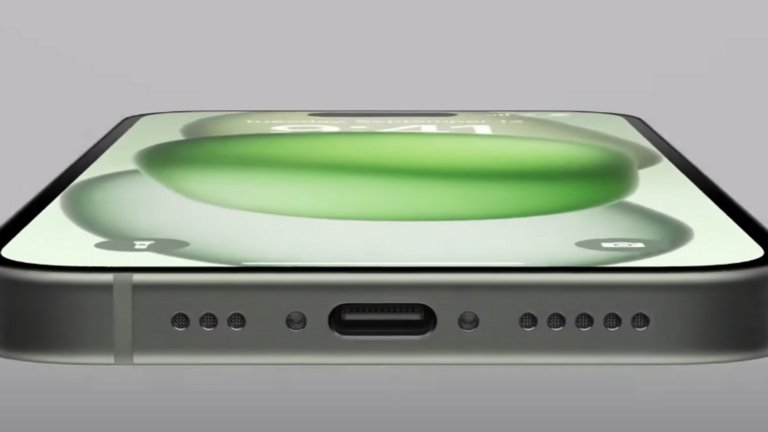Apple Unveils iPhone 15 with USB-C Port to Comply with EU Rules
Apple has made a significant shift in its iPhone lineup by introducing the iPhone 15 range, equipped with a USB-C charging port. This move marks the first change in the connector design of Apple’s flagship device since 2012. The decision comes as a response to EU regulations mandating that all portable electronic devices must have a universal connector by the end of 2024 to reduce electronic waste and simplify life for consumers. Although Apple initially opposed this requirement, it confirmed the transition during its iPhone unveiling event on Tuesday.
Apple’s Kaiann Drance explained that the shift to USB-C was driven by the fact that it has become a universally accepted standard. The iPhone 15 lineup closely resembles its predecessor, the iPhone 14, with options including a standard 6.1″ model priced at £799, a 6.7″ plus version for £899, and more powerful pro models in the same screen sizes, costing £999 and £1,199. All four variants will feature USB-C connectors when they are released on September 22.
Analysis: Apple Adapts to Changing Global Dynamics
Tech giants like Apple are facing growing challenges as they navigate a world of shifting geopolitical tensions and varying regulations. Apple’s recent decision to include a USB-C charger in its iPhone design is just one example of how external factors influence its business decisions. Global regulators have diverse approaches to online safety and policies governing artificial intelligence, making it more complex for tech companies to operate.
Additionally, concerns over escalating tensions between the United States and China have led to fluctuations in Apple’s stock value. The Chinese government’s restrictions on the use of American devices by state employees raised concerns among investors. As a major player in the global tech landscape, Apple’s relationships with different countries, especially China, have become increasingly crucial.
USB-C Adoption: A Step Towards Reducing E-Waste
The adoption of USB-C aligns the iPhone with other Apple products like the latest Macs and iPads, as well as rival Android phones, cameras, laptops, e-readers, and gaming consoles. During the event, Apple also announced that the standard wired earphones and the charging case for its AirPods Pro earbuds would transition to USB-C. While USB-C is gaining popularity, experts express concerns about the potential increase in electronic waste due to the obsolescence of older cables.
Apple addressed these concerns by announcing environmental initiatives, including discontinuing the production of leather phone cases and watch straps. The upcoming Apple Watch Series 9 will be the company’s first carbon-neutral device, and Apple aims to achieve carbon neutrality by 2030.
iPhone 15: Enhanced Features and New Colors
Apart from the USB-C shift, Apple introduced several improvements to entice iPhone users to upgrade. The standard and plus models of the iPhone 15 feature a 48-megapixel camera, a telephoto lens with two-times zoom, and a screen twice as bright as their predecessors. They also include the “dynamic island,” replacing the notch with a smaller cutout in the screen to change the appearance of notifications.
Satellite connectivity, allowing users to make calls without mobile coverage, will now include the capability to summon roadside assistance in remote areas, initially limited to the US. Notably, the new iPhone 15 lineup offers pink as one of the new color options. The pro model boasts a titanium case, a customizable action button, an advanced camera with five-times optical zoom, a brighter screen, and a faster chip.
Apple Watch Series 9: Innovative Blood Flow Detection
The Apple Watch Series 9, priced at £399, introduces an innovative feature that can detect tiny changes in the wearer’s blood flow. This capability allows users to initiate various actions, such as starting a stopwatch or answering a call, by tapping their index finger and thumb together, leaving the other hand free for other tasks. Additionally, Apple revealed the Apple Watch Ultra 2, aimed at fitness enthusiasts with a price tag of £799.
Both the new iPhones and watches are set to hit the shelves on September 22. The announcements met expectations, with Apple shares experiencing a slight 1.7% decline after the event. Apple may still unveil new iPads later in the year, and its mixed-reality headset, priced at £2,800 and revealed earlier in the summer, is expected to arrive in early 2024.

